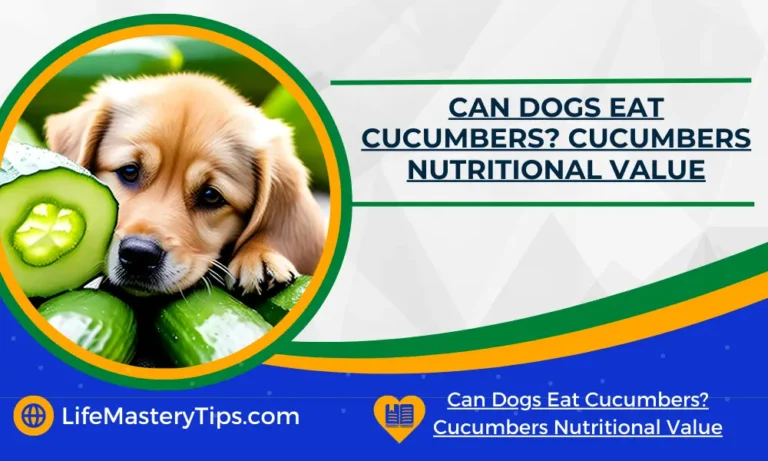Can dogs eat cucumbers? Good news! Dogs can safely eat cucumbers, making for a tasty and healthy alternative to treats. They’re low in calories, only around 8 per half-cup, compared to the hefty 40 in a standard dog biscuit. Plus, cucumbers are fat-free and super low in sodium.
Yet, be mindful of potential issues like overeating or choking. Introduce new foods slowly, especially if your furry friend hasn’t tasted them before. Consult your vet before making any dietary changes for your dog.
Watch out for choking hazards. Cut cucumbers into manageable pieces, particularly for smaller dogs or those with a habit of gulping down their meals. Feeding a whole cucumber is not a wise move to avoid any mishaps.
Are Cucumbers Good for Dogs?
Veterinarians recommend treats constitute only 10% of your dog’s daily diet. Tailor the cucumber portions based on your dog’s size, be it a German Shepherd or a tiny Chihuahua. Gradually introduce cucumbers into their diet, and keep an eye out for any adverse reactions.
Cucumbers aren’t just safe; they’re fantastic for dogs, especially those on a weight-loss journey. With a water content of 96%, cucumbers are a hydrating summer snack. Ideal for overweight dogs, they’re low-calorie, making them a tasty treat when combined with exercise and a diet plan.
Stay away from pickles, though. Pickles contain unnecessary spices and salt that can harm your dog. Stick to plain cucumbers as a regular treat to keep your furry friend happy and healthy.
Pickled Cucumbers and Juice for Dogs
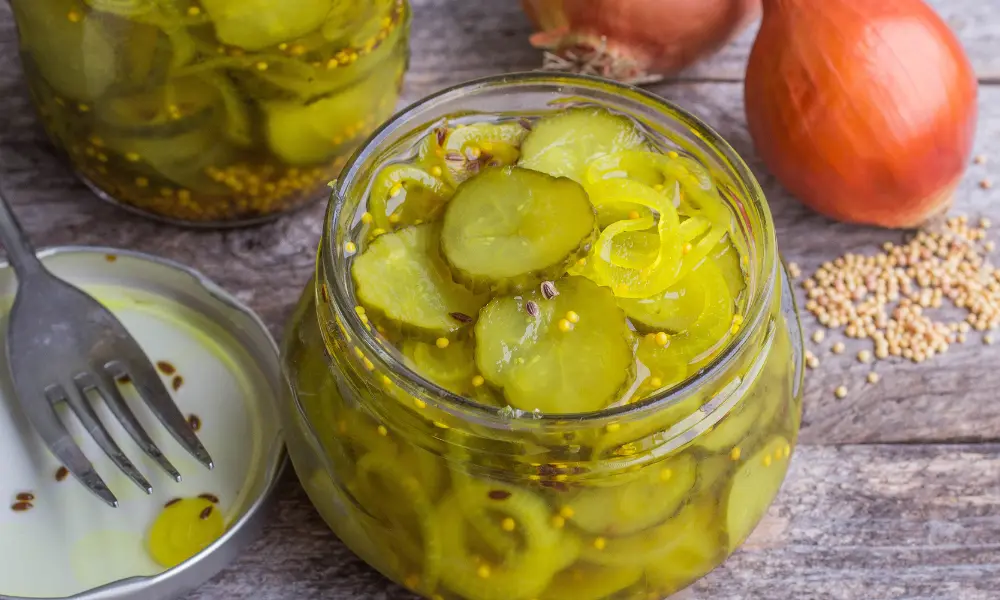
Avoid giving pickled cucumbers to your dog, as they contain ingredients not suitable for dogs and may be harmful. Although pickles are crafted from cucumbers and are not harmful to dogs, their high sodium content makes them an unhealthy choice for your furry friend.
Homemade cucumber water is a safe treat for your dog. Steer clear of store-bought versions, as they might contain harmful additives like xylitol, which can be dangerous for your pup.
Munching on crisp cucumber slices supports your dog’s oral health by effectively cleaning teeth and gums. This chewing action removes debris and plaque, minimizing the likelihood of dental problems.
Nutritional Value in Cucumbers for Dogs:
Cucumbers, with their high water content, are a cool treat for your pup. They’re low in calories, making them a healthy nibble for chubby or diabetic dogs. Still, check with your vet before making them a canine snack.
| Nutrient | Function | Source in Cucumbers |
|---|---|---|
| Fibre | Supports digestive tract and improves stools | Mostly in the cucumber’s skin |
| Vitamin B1 (Thiamine) | Monitors energy | Present in cucumbers |
| Vitamin B5 (Pantothenic Acid) | Key in energy production | Found in cucumbers |
| Vitamin B6 (Pyridoxine) | Aids immune and nervous system, supports red blood cell production | Available in cucumbers |
| Vitamin C | Removes free-radical molecules, supports immune system, fights inflammation | Essential in cucumbers |
| Vitamin K | Strengthens bones, aids blood clotting and coagulation, repairs skeletal wear and tear | Active in cucumbers |
| Potassium | Supports healthy kidney function, aids heart, muscle, and digestive function | Abundant in cucumbers |
| Manganese | Improves energy production, supports protein and fatty acid metabolism | Micro-mineral in cucumbers |
| Molybdenum | Needed for normal cell function, processes carbohydrates, regulates copper levels | Trace amounts in cucumbers |
| Calcium | Supports bone growth | Trace amounts in cucumbers |
| Zinc | Supports immune system | Trace amounts in cucumbers |
| Iron | Supports immune system | Trace amounts in cucumbers |
Vitamins K, C, and B hang out in cucumber slices. But here’s the thing – your pup should get all they need from their doggy chow. No need for extra vitamins from cucumbers.
If the vet gives a nod, here’s how to serve up cucumber safely. Rinse it well, lose the skin and seeds, cut it small, and keep it plain. No fancy seasonings or add-ons.
Pickled cucumbers, though? Not for your pup. They pack human stuff that dogs can’t stomach, like garlic and too much salt. Stick to plain cucumber for your furry buddy.
Puppies can join the cucumber club too. Just chop it small, so they don’t choke. And always check with the vet before introducing new snacks. Remember, start small. One tiny piece and see how your pup reacts. If anything weird happens, like puking or acting lazy, call the vet ASAP.
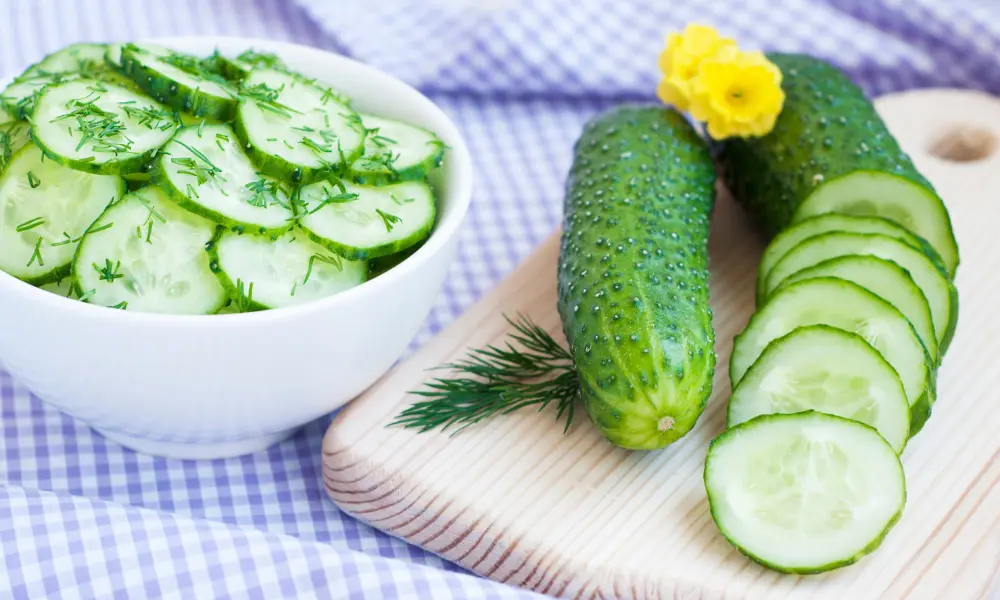
Is Cucumber Safe for Dogs?
Can dogs eat cucumbers sately? Yes! Dogs can enjoy sliced or diced cucumbers as a tasty treat. Moderation is key, especially during hot days, as the high water content can help keep your pet hydrated. The satisfying crunch and juicy texture make cucumbers a healthy alternative to traditional treats.
Is Cucumber Healthy for My Dog?
Absolutely! Fresh cucumbers are 96% water, offering a refreshing crunch on hot days. They also provide essential vitamins like C and K, potassium, and magnesium for a well-balanced canine diet. Avoid pickled cucumbers, though, as they often contain ingredients harmful to dogs.
| Serving Idea | Description |
|---|---|
| Combine chopped cucumber with other fruits and veggies | Create a dog-friendly salad side dish by mixing cucumber with cantaloupe, celery, and pear. |
| Stuff cucumber rounds with spreads like peanut butter | Make fun treats by stuffing cucumber rounds with peanut butter or cream cheese. |
| Freeze peeled cucumber chunks for teething treats | Provide a refreshing teething treat by freezing peeled cucumber chunks. |
| Use small cucumber pieces as low-calorie training treats | Train your dog with healthy alternatives by using small cucumber pieces. |
| Top regular dog food with cucumber slices | Add a refreshing twist to your dog’s regular meal by topping it with cucumber slices. |
| Dehydrate cucumber slices for a chewy, summery treat | Create a chewy and summery dog treat by dehydrating slices of cucumber. |
Can Eating Cucumbers Be Dangerous?
While cucumbers are generally safe, watch out for overeating or choking hazards. Remove the skin and seeds for sensitive stomachs, and cut them into manageable sizes for dogs who devour their food. Start with small amounts to ensure your dog tolerates cucumbers well.
How Much Cucumber Can My Dog Eat? Benefits!
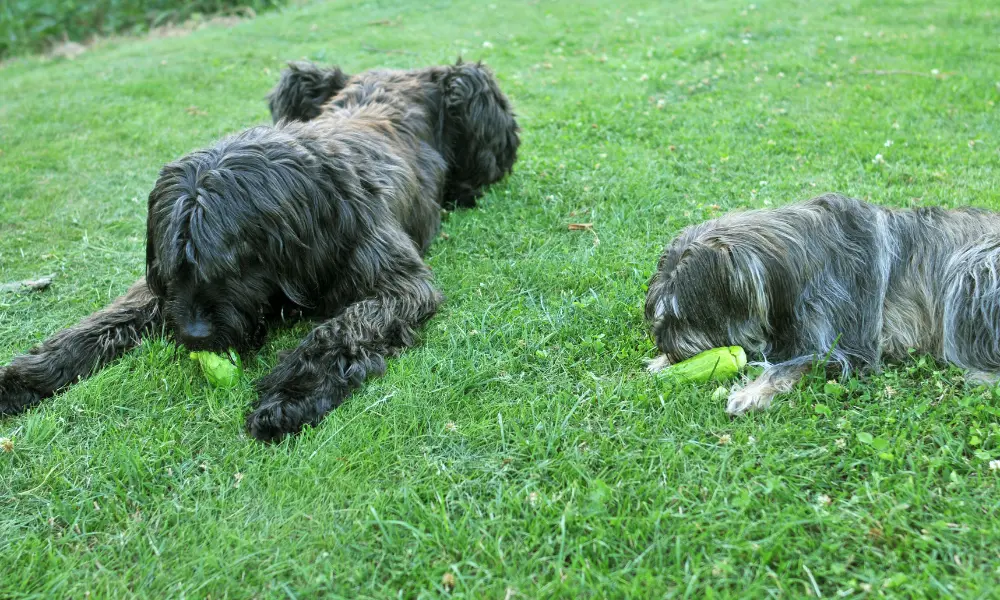
Follow the 10% rule: treats, including veggies, should make up 10% of your dog’s daily caloric intake. Fresh cucumbers are low in sugar and calories, making them an ideal option for dogs on a reduced-calorie diet or with diabetes. Adjust portions based on your dog’s size and dietary needs.
Cucumbers, with over 90% water content, keep dogs hydrated, acting as a natural canine ice lolly. Cucumber skin provides soluble fiber, promoting good gut bacteria and maintaining a healthy colon. Cucumbers offer vitamins A, B, C, potassium, manganese, and copper, supporting various bodily functions.
Phytonutrients and phytochemicals in cucumbers combat mouth bacteria, contributing to better breath. While generally safe, too much cucumber can lead to diarrhea or choking. Introduce it gradually, cut it appropriately, and clean it thoroughly to remove pesticides. Consult your vet for personalized advice.
Tailor portions to your dog’s size. Larger breeds may enjoy a quarter of a cucumber, while smaller breeds should stick to an eighth. Cucumber’s low-calorie nature makes it suitable for dogs with weight or diabetes concerns.
Prepare Tasty Cucumber Snacks!
Make cucumber treats exciting by creating “Cucumber and Yogurt Coolers.” Follow the simple recipe:
| Ingredients | Instructions |
|---|---|
| 3 tablespoons organic Greek yogurt | Mix with one unpeeled cucumber. |
| 1 cucumber (unpeeled) | Add a generous drizzle of runny honey. |
| 1 generous drizzle of runny honey | Blend the ingredients and spoon into an ice tray. |
| Freeze for 3 hours, then serve to your dog for a refreshing treat. |
When whipping up some delightful cucumber treats for your dog, go for organic cucumbers. Opting for these ensures you sidestep potentially harmful pesticides. Plus, it’s a win-win as you support sustainable farming and eco-friendly products.

Keep It Clean – Always!
Before you share those crunchy treats with your dog, give the veggies a good rinse. This simple step eliminates any lurking germs acquired on your journey from the store. It’s especially crucial if you have a young puppy whose immune system is still in the works.
Raw or Cooked? Your Pooch’s Call!
Cucumbers pack the most nutritional punch when served raw. Surprise – you can cook them too! The choice between raw and cooked is entirely up to your dog’s taste buds.
The Grand Finale – Treat Time!
Now comes the fun part – treating your pup! Cucumbers serve as a straightforward, healthy snack or the base for some extra special creations.
Cucumber’s Canine Appeal
Cucumbers, a kitchen staple for humans, have also made their way into the realm of dog cuisine. While some pet owners may feel uncertain about sharing cucumbers with their furry friends, emerging evidence suggests that these crisp veggies can be a tasty and healthy treat for dogs.
Cucumbers pack a punch of nutrition, delivering a range of vitamins, minerals, and fiber. Vitamin C boosts the immune system, while vitamin K plays a crucial role in blood clotting. Essential minerals like potassium and magnesium contribute to muscle and nerve function, and the high fiber content aids digestion, ensuring a healthy digestive tract.
Incorporating cucumbers into a dog’s diet offers a myriad of advantages, supporting overall health and addressing specific wellness concerns. As a low-calorie, low-fat alternative to traditional treats, cucumbers facilitate weight management. The fiber content promotes fullness, curbing overeating and promoting a healthy weight. Moreover, these veggies can offer hydration for active dogs, serving as a natural water source.
Cautionary Consumption: What to Know?
While generally safe, moderation is crucial when feeding dogs cucumbers. Overindulgence may lead to digestive issues like gas or diarrhea. Veterinarians recommend that no more than 10% of a dog’s daily diet come from treats, including cucumbers. Serving sizes should be adjusted based on the dog’s size, with caution exercised when introducing this veggie to their diet gradually.
Cucumbers can be introduced into a dog’s diet in various ways, providing unique benefits. Sliced or diced fresh cucumbers make for a crunchy treat. Alternatively, mashed cucumbers can be added to regular kibble or wet food, ensuring dogs enjoy the nutritional perks without the need to pick out individual pieces.
In rare cases, cucumbers may pose risks to dogs with pre-existing digestive issues. Cucumber peels, a potential choking hazard, should be removed, especially for smaller dogs. Pickled cucumbers, laden with sodium, should be avoided.
Insights from Spot: A Peek into Pet Parent Responsibilities
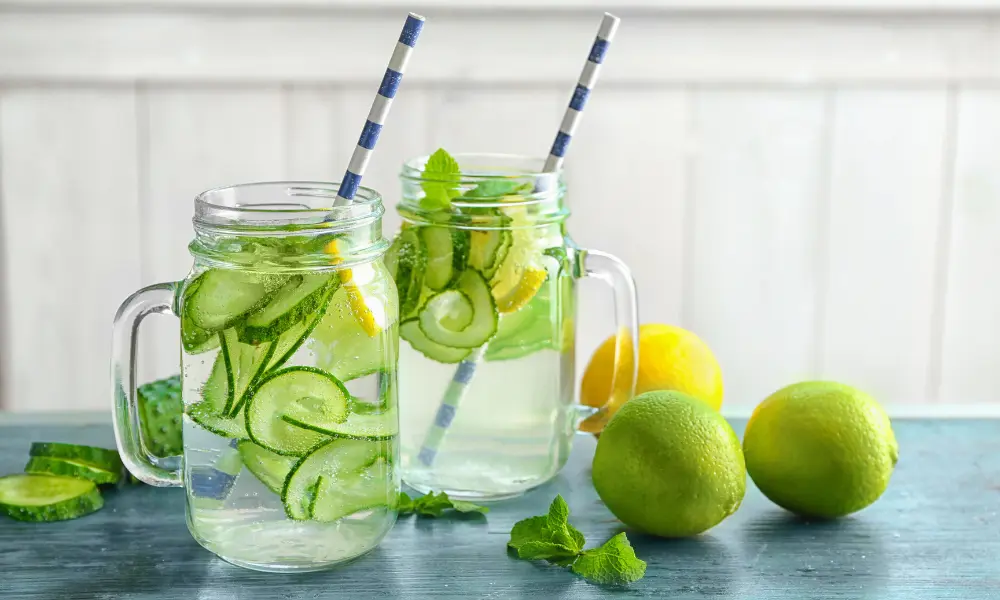
Sharing favorite foods with pets can be enjoyable, but it’s crucial to consider potential stomach upset. Spot’s internal data underscores the financial impact, with dietary indiscretions costing an average of $572. Being mindful of pet treats can aid in maintaining pet health and avoiding unnecessary vet bills.
Spot Pet Insurance Plans offer support in moments of pet health uncertainty. With services like the 24/7 VetAccessTM Helpline and coverage for ingested toxins or objects, pet parents can navigate unforeseen challenges, ensuring their pets receive the care they need.
Cucumbers can be a delightful and beneficial addition to a dog’s diet when approached with knowledge and care. Their nutritional value and refreshing properties make them a wholesome treat, contributing to a dog’s overall health and well-being.
Always consult your veterinarian before introducing new foods to your dog’s diet, considering factors like age, health history, and diet restrictions.
Can Dogs Eat Cucumber Skin?
When it comes to dogs and cucumber skin, it’s usually better to play it safe. Although the skin itself isn’t poisonous, some pups may struggle to handle it. The skin is tough and full of fibers, making it a bit hard for dogs to digest. Too much of it might upset their stomach, leading to issues like diarrhea or vomiting.
If your furry friend eats cucumber skin in excess, it could spell trouble. The toughness of the skin poses a digestion challenge, and dogs may feel the consequences. To keep digestive problems at bay, it’s wise to peel the cucumber before offering it to your dog.
Cucumber skin might harbor unwelcome guests—harmful chemicals. Pesticides, commonly used on cucumbers, can linger on the skin even after a good wash. These chemicals have the potential to harm dogs, causing serious health complications. To be on the safe side, opt for organic cucumbers or make sure to thoroughly wash them before sharing with your furry companion.
Cucumber Considerations: A Pup’s Perspective
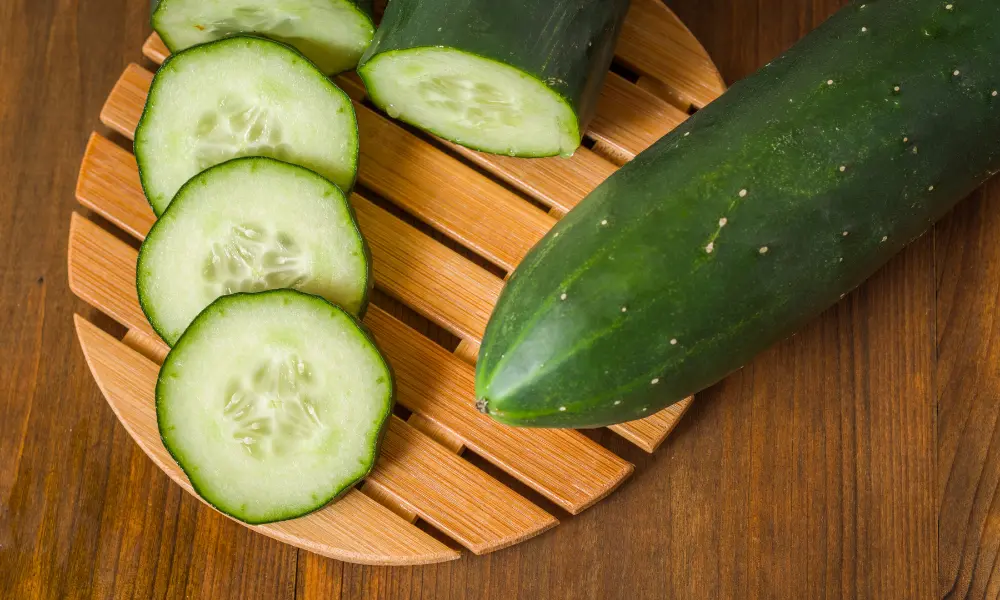
Considering sharing cucumber slices with your dog? Worry not! Cucumbers are a safe and healthy treat for dogs, offering a crunchy texture and refreshing taste that many canines love.
Are Cucumbers Bad for Dogs?
Raw cucumber slices are safe for adult dogs and puppies, provided they are washed, cut into thin slices, and fed in moderation. Whole cucumbers or large pieces may pose choking or intestinal blockage risks, especially for smaller dogs. However, caution is advised with pickles, as their high salt content and seasonings like garlic and onion can be harmful.
Potential Risks and Digestive Delicacies
Some dogs may be intolerant to cucumbers, so it’s advisable to start with a small piece and observe for signs of digestive upset. Cucurbitacin, a compound in cucumber plants, can be bitter and may be present in the ends and peel; removing them mitigates potential harm.
Cucumber Seeds: To Eat or Not to Eat?
Cucumber seeds are not toxic, but some dogs may struggle to digest them, leading to upset stomachs. To avoid this, remove the skin and seeds before offering cucumbers to your dog.
Cucumber Water Wisdom
Homemade cucumber water is safe for dogs, but store-bought versions may contain unsafe ingredients like xylitol, which is toxic. Caution is urged when introducing any new treats, including cucumber water, to a dog’s diet.
Feeding Guidelines Based on Size
The amount of cucumber safe for dogs varies by size, with treats ideally constituting 10% of their diet. Guidelines for safe feeding portions based on weight and breed size are provided.
Monitoring for Upset Tummies
Excessive cucumber consumption may lead to symptoms of upset stomach. Vigilance is essential, and if signs like decreased appetite, vomiting, or diarrhea occur, prompt veterinary attention is recommended.
Safe and Savory Cucumber Feeding Practices
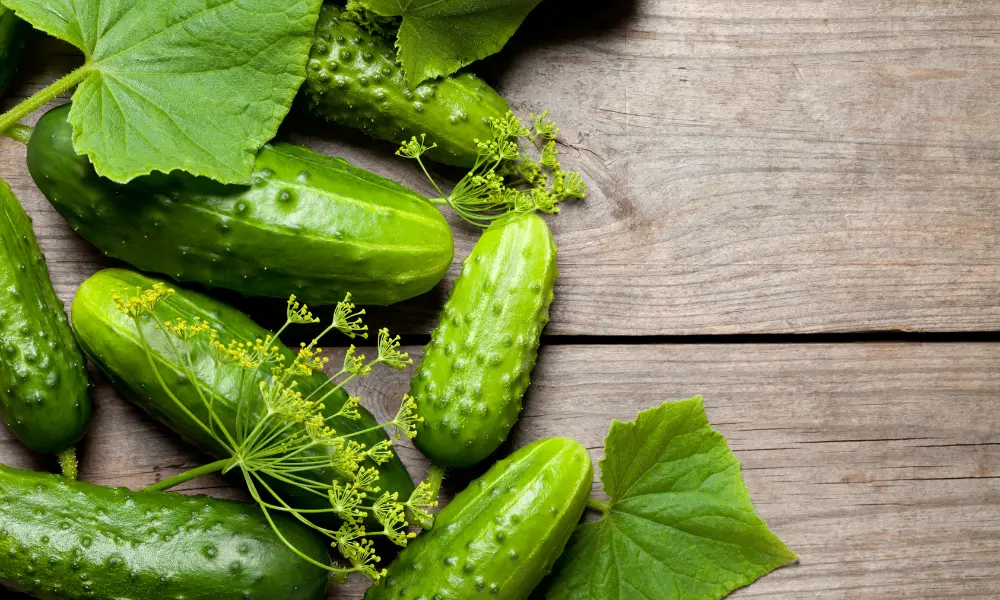
To safely feed cucumbers to dogs, wash them thoroughly, peel, remove seeds, and cut into thin slices. Small, bite-sized pieces minimize choking risks.
| Feeding Method | Description |
|---|---|
| Offer raw cucumber slices as treats or as a food bowl topper. | Provide fresh cucumber slices as a standalone treat or add as a topping to your dog’s food bowl. |
| Freeze cucumber slices for a crunchy, cold treat. | Create a chilled and satisfying treat by freezing cucumber slices, offering a crunchy delight for your canine companion. |
| Blend cucumber with dog-safe fruits, freeze in a KONG toy for a refreshing, interactive treat. | Mix cucumber with safe fruits, freeze the blend in a KONG toy, creating an engaging and refreshing interactive treat for your dog. |
Dogs can indeed enjoy the crisp, hydrating goodness of cucumbers as a treat. However, pet parents should exercise caution, keeping treats within recommended limits and prioritizing a well-balanced dog food diet.
Paws and Perspectives: Cucumbers as Canine Confections
Cucumbers emerge as a safe and healthy treat for dogs, offering a crunchy texture and minimal calories. Comprising 96% water, cucumbers serve as a hydrating option on warm days.
Nutritional Value of Cucumbers for Dogs
Cucumbers provide essential vitamins and minerals, including Vitamin K, C, B1, B5, and B6, molybdenum, potassium, manganese, and copper. While treats like cucumbers can be enjoyable, vets emphasize that they should constitute only 10% of a dog’s diet.
Feeding Guidelines for Canine Cucumber Consumption
While there are no strict rules, feeding dogs small amounts of cucumber is advisable to prevent digestive issues. Chopping into tiny, manageable pieces minimizes choking risks, especially for smaller dogs.
Puppy Perspectives: Cucumbers for the Little Ones
Puppies can enjoy cucumber treats, introduced gradually to avoid stomach upset. As with any new food, caution is essential, and cucumber pieces should be small to prevent choking hazards.
Balancing Treats and Nutrition for Dogs
Despite the benefits of cucumber treats, a balanced and complete dog food diet remains paramount. Vets recommend treats making up only 10% of a dog’s diet, with the majority derived from regular dog food.
Cucumbers can be a delightful addition to a dog’s diet, offering a blend of hydration and nutrition. However, pet parents should exercise prudence, ensuring treats complement, rather than overshadow, a well-balanced canine diet.
Are Cucumbers Safe for Dogs?
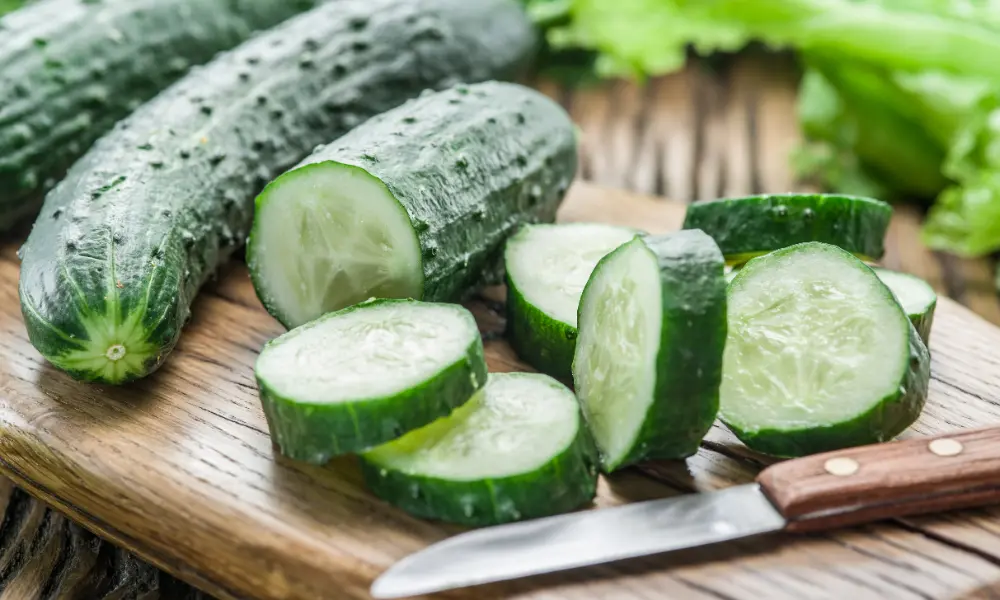
Cucumbers aren’t harmful to dogs, but there are worries about potential risks. A primary concern is the danger of choking. Dogs might struggle with swallowing whole cucumbers, increasing the risk of choking or digestion problems. To keep things safe, it’s wise to avoid giving your furry friend entire cucumbers. Opt for bite-sized cucumber slices instead.
Dogs vary in size, and what’s okay for one may pose a risk for another. Ensuring the cucumber pieces are manageable is key. Small slices minimize the risk of choking, making it a safer and enjoyable snack for your pup.
Feeding cucumbers to dogs also raises concerns about digestive issues. The high water and fiber content in cucumbers could lead to diarrhea or an upset stomach if your dog overindulges. Introduce new foods gradually, starting with small amounts to observe your dog’s reaction and avoid potential digestive discomfort.
While cucumbers may seem like a healthy doggy snack, it’s essential to note that they lack significant nutritional value. Primarily composed of water, cucumbers offer modest amounts of vitamin K, vitamin C, and potassium. They can be a delightful occasional treat, but they contribute minimally to your dog’s overall nutrition.
Can Puppies Also Enjoy Cucumbers?
Cucumbers bring good vibes to your pup’s diet. They’re safe and pack a punch of vitamins and minerals that boost your little buddy’s immune system. Plus, they’re light on calories, making them a guilt-free option.
Now, here’s the deal – while cucumbers are a nutritional jackpot, don’t go overboard. Too much cucumber in one go might stir up some tummy trouble, leading to a bout of diarrhea. Keep it chill and stick to a few slices, especially if your pup is still in the early growth stages.
Hold up! Cucumbers are a fantastic snack, but they can’t replace a well-rounded diet. Your puppy needs the full spectrum of proteins, carbs, and fats to stay tip-top. So, toss in some variety to ensure your furry pal gets all the essential nutrients.
In a nutshell, cucumbers are a puppy-approved snack, but moderation is the name of the game. Keep the treats balanced, and your pup will be one happy, healthy camper!
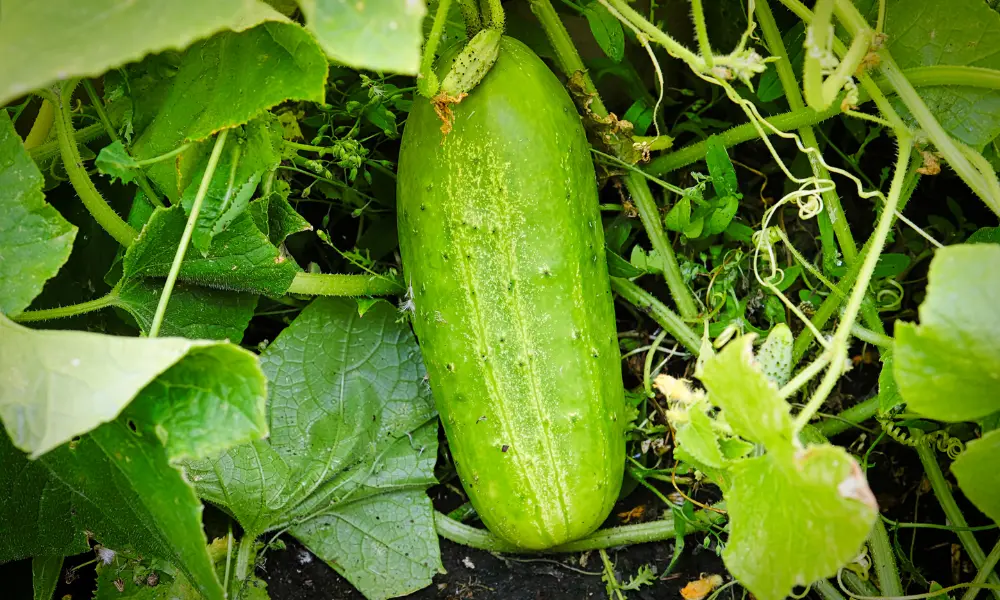
Bonus Read | Can Dogs Eat Cucumbers?
Cucumbers are a healthy snack for dogs and offer many nutritional benefits. They are low in calories and fat and high in fiber and water. Cucumbers also contain vitamins A, C, and K and minerals like potassium and magnesium. All of these nutrients are beneficial for your dog’s overall health.
During scorching summer days, cucumbers serve as a hydrating snack for your pet, thanks to their abundant water content. The crisp crunch and juicy texture of a ripe cucumber can be as delightful for your dog as a store-bought treat, making it an excellent and healthy alternative for training rewards.
Cucumbers are a great option if you’re looking for a healthy and tasty snack for your dog! Just make sure to wash them before giving them to your pup, and feed them in moderation. If you notice your dog having any adverse reaction after eating cucumbers, such as vomiting or diarrhea, stop feeding them cucumbers and consult your veterinarian.
FAQ
Can Dogs Eat Cucumbers Seeds?
Absolutely, cucumber seeds are safe for dogs to consume as they are non-toxic. Nonetheless, certain dogs and puppies may encounter difficulty digesting these seeds, potentially leading to an upset stomach. To prevent this, it is advisable to remove both the skin and seeds from the cucumbers before offering them to your canine companion.
Can Dogs Eat Cucumbers Skin?
Dogs can enjoy cucumber skin along with its seeds. Interestingly, the skin stands out as the optimal choice, being rich in fiber and hosting a higher concentration of essential Vitamins A, B, C, and K. It’s crucial, however, to meticulously clean the cucumber to eliminate any potential pesticide residue before offering it to your furry friend.
Can Dogs Eat Cucumbers Leaves?
The entire cucumber plant, encompassing its fruit along with the leaves, skin and seeds, poses no toxicity risk to dogs. However, this doesn’t guarantee that your canine companion will consume any portion of the cucumber. Provide your furry friend with simple cucumber slices, avoiding any additional seasonings or human food additives. Introduce cucumber to your canine companion in modest portions, treating them to a few slices occasionally.
